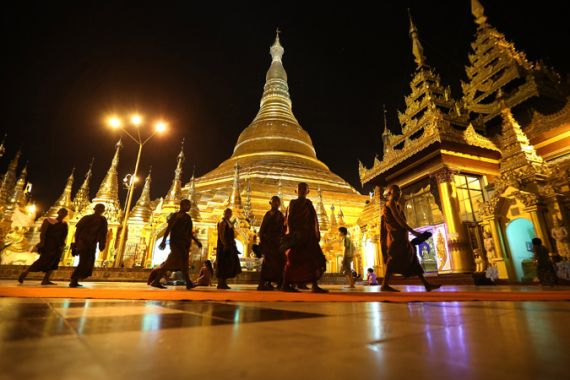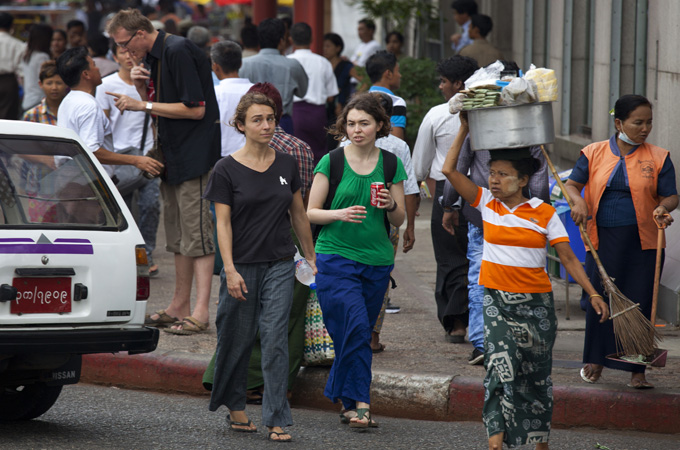Myanmar’s new battle
The country faces challenges including distributing aid money and limiting the damage of the West’s liberalising agenda.

 |
| As Myanmar opens up to the world, tourists and foreign aid money will be flowing into the country – but without first combatting corruption and a non-transparent aid distribution system, it could be counterproductive [GALLO/GETTY] |
Yangon, Myanmar – As the sun appears to be setting on more than half a century of military rule in Myanmar, a different battle looms on the horizon. Behind the lofty diplomatic exchanges between Brussels and Naypyidaw that have accompanied the EU’s decision to suspend sanctions lies unease at a new challenge facing a population that for decades has carried the burden of neglect – that of too much attention.
It many ways it comes as little surprise that British Prime Minister David Cameron, who has publicly gunned for a stronger presence in the Asia-Pacific, led the charge to Myanmar: his foreign secretary, William Hague, said last year that the main business of the British government abroad was “British business” – a candid admission from a man supposedly tasked with political diplomacy – and the forces have combined in Myanmar to make the country ripe for this policy goal.
Other EU nations will quickly follow suit – the end to the blockade means that Myanmar’s coveted teak, jade and natural gas, not to mention vast acreage for monoculture and a millions-strong pool of cheap labour, are all up for grabs, as is a chance to build a presence in a country strategically positioned between India and China, and which acts as a gateway to south-east Asia’s emerging economies.
The picture is tantalising for a bloc now staring down the barrel of a recession, but its lust for new ground will complicate the scenario for the forces in Myanmar that, for decades, have fought for civilian governance, equality and an end to the plundering of the military elite. It is they, who, during the country’s darkest hours, called on the international community to apply unrelenting pressure on the generals – now with a sliver of light emerging, that pressure retreats and the courting begins.
|
|
Whether in the budding business arena EU nations will hold true to the desires of Myanmar’s population remains to be seen, but their entry to the country carries significant risks. Current investment laws do little to ensure the abuses of civilians that accompanied the past decade of Chinese, Thai, Singaporean and Korean investment are now a thing of the past – indeed without tighter rules, increased investment could exacerbate the fallout from business.
The aid ‘curse’
Existing regulations, such as forcing companies to carry out Environmental Impact Assessments, are “very weak and implementation of these regulations are even weaker”, says Alfredo Perdiguero, Principal Economist at the Asian Development Bank. Historically, this has allowed overseas companies to begin on major energy projects without needing to take into consideration the effect on local populations, tens of thousands of whom have been displaced.
Recent efforts by civil society groups to ensure that international business is made to consult with local populations have not borne fruit, nor has the government signalled that these consultations will become mandatory practice.
Another all too familiar problem is the aid “curse”. Donors are set to ratchet up assistance to Myanmar, with the US having already given the nod to channel new funds to the country. On the surface it makes sense – for the past 15 years Myanmar has received a fraction of the aid given to neighbouring countries, largely due to distrust of crooked government officials – but continued corruption and a less than transparent aid distribution system could make this wholly counterproductive.
Murray Hiebert, deputy director of the south-east Asia program at the Center for Strategic and International Studies, warns that Myanmar “will be overwhelmed by a tsunami of foreigners and foreign money which it doesn’t have the staff, laws and infrastructure to handle”. Aside from the risks of inflation, a real likelihood given the infancy of Myanmar’s efforts to reform its economy, Hiebert says Myanmar could grow to become too dependent on foreign assistance.
Some will argue that this potential dependence plays nicely into the hands of western financial institutions, which have a history of dining out on the windfall from democratic transitions. While the likes of the World Bank and IMF often enact programmes that entail a slimming down of the state – and in Myanmar this could reduce the power of the military – they also carry with them the threat of a neoliberal hijacking of the country, if the government is made to relinquish control in favour of private enterprise.
Strengthening the military?
That strengthening of the private sphere carries a dual risk: Myanmar’s economic elite, who made their millions via close relations with the military and privileged access to the resources denied to the local population, could be further emboldened, as could their friends in the military, by a process that is in part aimed at overturning rampant cronyism.
There could be an even more direct channel for this, however: with a quarter of the state budget going directly to the armed forces, and, as yet, no indication that this will be overhauled, inflows of western capital could go straight to the entity that these reforms are ostensibly aimed at weakening. The natural gas sector – where western investment is expected to rise – is a particular problem, given that historically much of the revenue has gone to the military-owned Union of Myanmar Economic Holdings.
|
“With a quarter of the state budget going directly to the armed forces… inflows of western capital could go straight to the entity that these reforms are ostensibly aimed at weakening.“ |
Demands that the government come clear on how it will spend the profits from EU investment should be a precursor to ending sanctions. Likewise, the west should be articulating a formula for tackling these myriad problems and limiting the damage likely to be caused by Myanmar’s entrance to world markets.
Perhaps it doesn’t have one, however. While the suspension of sanctions is being pitched as a marker of progress inside Myanmar, less is said about the European interests that have driven the move – were they to be clearly outlined, we may be thinking again about what priorities are actually fuelling re-engagement.
For all their talk of democratic reform, European governments have a less than stellar record in meeting the needs of everyday Myanmar. Pernicious business was allowed to quietly continue throughout the sanctions era – France’s Total in the energy sector and Britain’s Malcolm Dunstan and Associates in construction, while German-manufactured parts showed up in alleged weapons’ production facilities – and plans were laid for a future when trade and investment could flourish.
Enter Myanmar’s economy
Indeed political analyst Maung Zarni says that, prior to the September 2007 uprising, Britain and Norway – ironically the two European countries that made the hardest push for an end to sanctions – together funded a survey of Myanmar’s rice economy “with a neoliberal spin for marketisation of rice agriculture”, a potentially multi-billion dollar industry should Myanmar’s once world-leading export return to its glory days of the 1930s.
The incentives for entering Myanmar’s economy are clearly huge, and it’s uncertain how far back the EU’s blueprints go. Done in the right way, investment could drive growth in all the right areas, but the current environment makes that a long shot – laws are notoriously malleable, and it’s unlikely that the country’s elite will take on substantially progressive measures if it risks cutting into their own economic interests.
New demands will then press on Myanmar’s pro-reform lobby, chiefly how to spot and then limit the damage of the west’s liberalising agenda. Democratic transition is a time of jubilation, but often it can introduce a new brand of hegemony perhaps more complex than the manifestations of power that Myanmar is accustomed to, where accompanying reforms are packaged and delivered by allies in a langage that belies their resultant impacts.
Follow him on Twitter: @Francis_Wade
